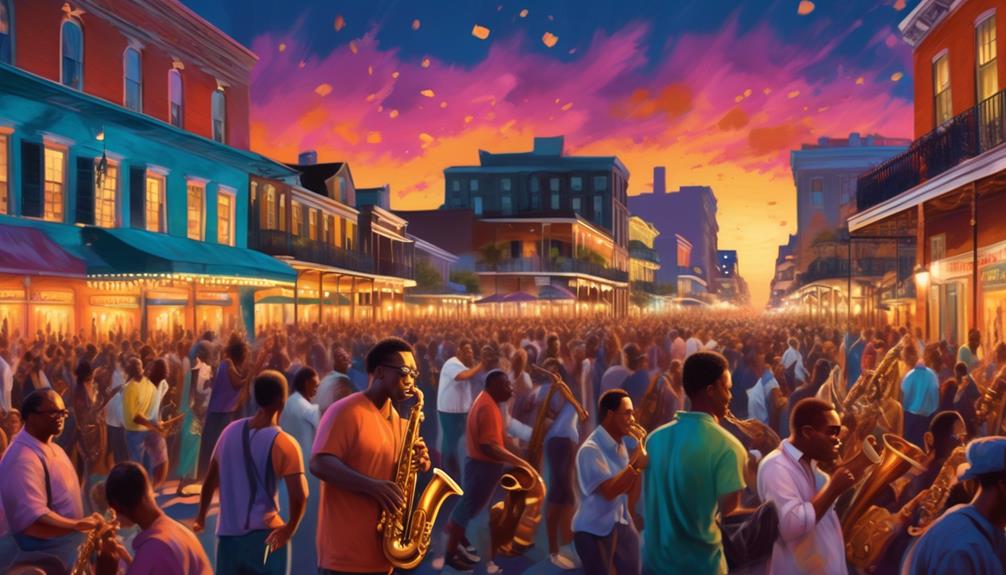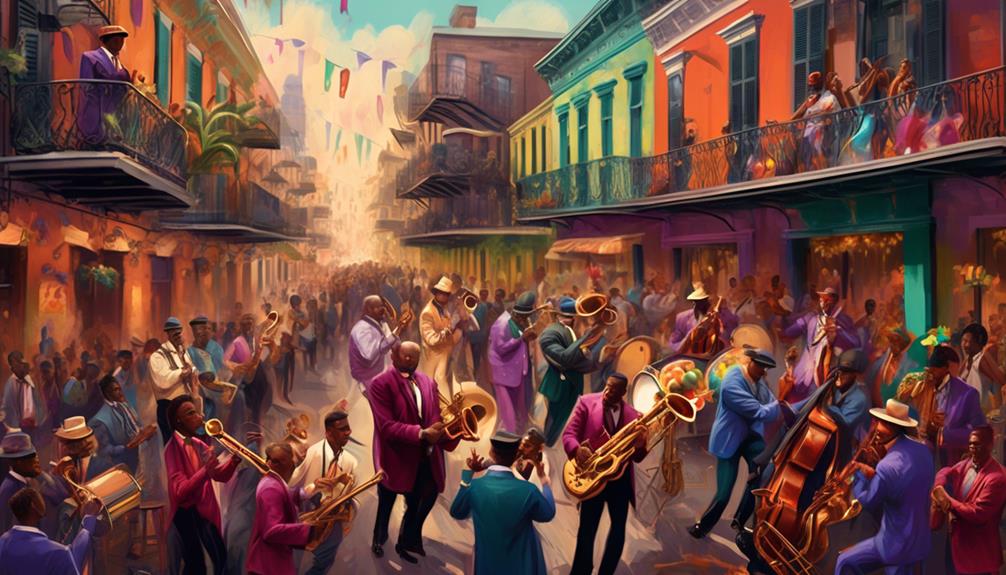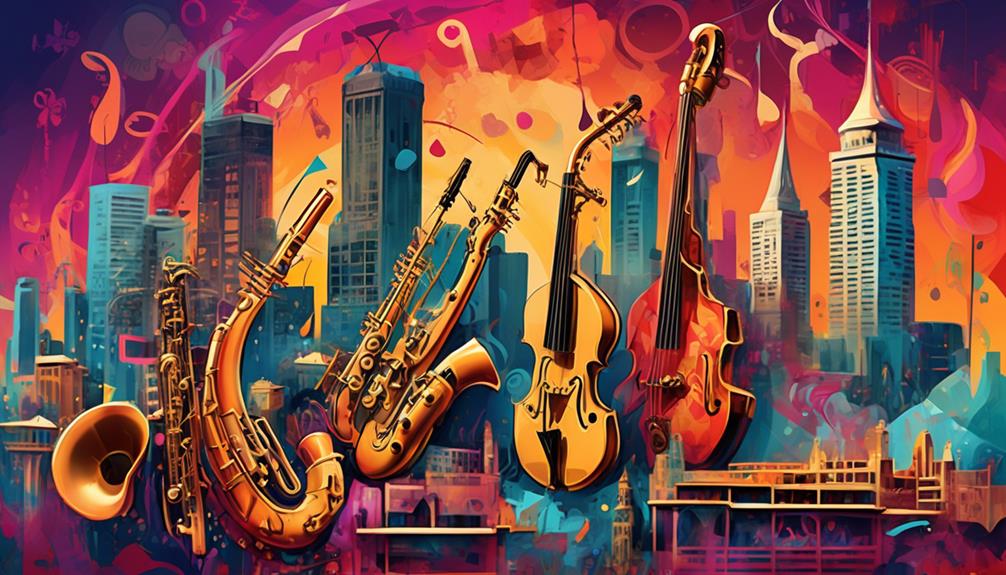
You've probably heard of the legendary New Orleans Jazz and Heritage Festival, an event that's become synonymous with the city's vibrant culture and resilient spirit.
Held annually since 1970, this epic music festival showcases an array of genres and has seen performances from some of the biggest names in music.
But how much do you really know about the Jazz Fest's rich history and its impact on New Orleans and the wider music world?
Get ready to test your knowledge and maybe learn something new about this iconic festival.
Key Takeaways
- Jazz Fest is a renowned music festival that originated in 1970 and quickly became one of the world's largest.
- The festival has showcased iconic performances from legendary artists such as Mahalia Jackson, Duke Ellington, The Rolling Stones, and Bruce Springsteen.
- Jazz Fest has played a significant role in shaping New Orleans' cultural identity and preserving its unique heritage.
- The festival's future looks promising due to its global interest, commitment to diversity, potential expansion of cultural offerings, and dedication to celebrating music, culture, and heritage.
Origins of New Orleans Jazz Fest
Sprouting from the unique culture of New Orleans music in 1970, the Jazz Fest was originally founded as a cosmopolitan gathering of music, food, and art lovers, quickly rising to become one of the world's largest music festivals. The New Orleans Jazz Fest, or the Orleans Jazz and Heritage Festival as it's officially known, was born out of a desire to celebrate the rich and diverse culture of New Orleans.
The festival's inaugural event took place at the Fair Grounds Race Course, featuring legends like Mahalia Jackson and Duke Ellington. Their performances solidified the festival's reputation, drawing crowds from around the globe to experience the authentic culture of New Orleans first-hand. It wasn't just about the music, but also the food, the art, and the city's unique heritage.
The origins of New Orleans Jazz Fest are deeply rooted in its city's history. It's more than just a festival; it's a symbol of New Orleans' resilient spirit, particularly after the devastation of Hurricane Katrina. The Jazz Fest became a beacon of hope, a testament to the city's unyielding spirit and its enduring love for music and culture.
Iconic Performances at Jazz Fest
While the origins of the New Orleans Jazz Fest are a testament to the city's resilient spirit, the festival's iconic performances tell a story of musical grandeur that has only grown over the years. The New Orleans Jazz and Heritage Festival, or Jazz Fest as it's commonly known, has seen a rich tapestry of iconic performances at jazz fest, leaving an indelible mark on the city's cultural landscape.
Consider these three highlights:
- The inaugural 1970 Jazz Fest, which boasted an impressive lineup including legends like Mahalia Jackson and Duke Ellington. This propelled the festival into the limelight.
- The unbelievable 25th anniversary in 1994, where an astounding crowd of 27 witnessed a masterclass from none other than The Rolling Stones.
- Bruce Springsteen's emotional 2006 performance with the Seeger Sessions Band that left the audience spellbound.
These performances, and countless others, have helped solidify Jazz Fest's place in the annals of music history. So, next time you're in New Orleans, make sure you take the time to appreciate the legacy of the city's iconic Jazz Fest.
Impact on New Orleans Culture

Diving into the heart of New Orleans culture, you'll quickly see how Jazz Fest has largely shaped the city, preserving and celebrating its unique heritage through music, art, and cuisine. As a symbol of resilience and revival, especially post-Hurricane Katrina, the Fest has been instrumental in securing the city's identity as a hub of diverse cultural influences.
Participating in Jazz Fest, you'll notice the emphasis on local talents. This Fair doesn't only provide a stage for big-name artists, it actively supports up-and-coming musicians, artists, and culinary masters. By doing so, it fosters community pride and economic growth.
The Jazz Fest Express, a transportation service dedicated to the festival, is a clear testament to its impact. It not only ensures that the Fest remains accessible to all, but also symbolizes how ingrained the event is in New Orleans' daily life.
In essence, Jazz Fest is more than a festival. It's a celebration of New Orleans heritage, a platform for its artists, and a beacon of the city's resilience. By preserving its culture and promoting its talent, Jazz Fest continues to shape the vibrant, unique fabric of New Orleans.
Evolution of the Heritage Festival
Now, let's trace back the roots of Jazz Fest and look at how it has evolved from its inception in 1970 to become a global celebration of New Orleans' rich musical, culinary, and artistic heritage.
From a modest beginning, it has swelled into one of the world's largest music festivals, drawing crowds from all corners of the globe.
Here are three key milestones in the evolution of Jazz Fest:
- The introduction of multiple stages, which allowed for the celebration of diverse music genres. Over the years, you've seen the festival grow from a single stage to a vibrant venue with multiple stages, each featuring unique performances.
- The incorporation of the Crafts Fair. This arts and crafts hub has become an integral part of the festival, showcasing Louisiana's rich artistic talent and offering a platform for local artisans.
- The designation of the Grand Marshal, a figure that embodies the spirit and culture of New Orleans. This tradition underscores the festival's deep roots in the community.
Today, as you walk down Gentilly Boulevard, the sounds, tastes, and sights of Jazz Fest serve as a testament to its enduring legacy and the resilience of New Orleans.
Future of Jazz and Heritage Festival

Looking ahead, you might wonder what the future holds for the New Orleans Jazz and Heritage Festival. With its wide range of music genres, it's no surprise that the festival has drawn people from around the world. This global interest ensures that the future of Jazz and Heritage Festival is bright.
The festival's commitment to showcasing a diverse array of music and cultures is what sets it apart. As long as there are new sounds to be discovered and shared, the festival's legacy will continue to grow. It's always a good idea to keep an eye on the festival's lineup for fresh additions.
Moreover, the authentic quiz on Orleans' Jazz Fest legacy could become a tradition, fostering deeper understanding and appreciation of the festival's history. This could further enrich the experience for attendees and spark interest in those yet to visit.
In the future, the festival may continue to expand its cultural offerings, featuring even more artists and cuisines from around the world. Despite any challenges it may face, the New Orleans Jazz and Heritage Festival's commitment to celebrating music, culture, and heritage secures its place in the future.
Frequently Asked Questions
What Should I Wear to New Orleans Jazz Fest?
You should wear breathable, comfy clothes to the New Orleans Jazz Fest. Don't forget a hat, sunglasses, sunscreen, and closed-toe shoes. Also, bring a reusable water bottle and dress in layers for changing weather.
Can You Bring an Empty Water Bottle to Jazz Fest?
Yes, you're allowed to bring an empty water bottle to Jazz Fest. It's a smart move to stay hydrated, especially since the fest often occurs in hot weather. Just remember to refill at available stations.
How Many People Go to the New Orleans Jazz and Heritage Festival?
You're curious about the attendance at the New Orleans Jazz and Heritage Festival. Well, it's pretty popular! On average, about 400,000 people flock to enjoy the music and culture each year. That's a lot of jazz lovers!
Is New Orleans Jazz Fest Kid Friendly?
Yes, the New Orleans Jazz Fest is kid-friendly. With a dedicated kids' tent, interactive activities, child-friendly entertainment, and diverse food options, it's a welcoming and inclusive environment for families. They even allow strollers!
Conclusion
So, you've danced through the history and impact of the Jazz Fest, marveling at its iconic performances and its evolution.
It's no coincidence that this event has become a symbol of New Orleans' resilience and culture. As you look to the future, remember the fest's legacy.
It's more than just music, it's a celebration of life, spirit, and heritage. And who knows? You might find yourself grooving to the beat at the next Jazz Fest.
